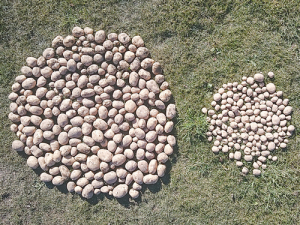Border controls hit spud growers
Potato growers say the recent border controls around Auckland affected supply chains and transit for staff living outside the region.
 The yield from the 2015-16 field test of fine Econet mesh, left, compared with the yield from control plants, right.
The yield from the 2015-16 field test of fine Econet mesh, left, compared with the yield from control plants, right.
The potential for fine mesh covers on potato crops to control pests and diseases globally is “huge”, says a researcher now doing field trials near Christchurch.
Dr Charles ‘Merf’ Merfield recently presented trial findings to a small group braving southerly squalls at the site, near Lincoln University.
The research, over several seasons, arose originally from the need to control small flying insects, but the mesh has shown further unexpected benefits -- control of potato blight and better yield.
Merfield heads the Future Farming Centre within the university’s biological husbandry unit, a charitable trust joint venture between Lincoln and the New Zealand Organic Movement.
He says potatoes are now the third or fourth most important food crop globally, with tonnages grown in the developing world now outstripping the developed world. However, these are susceptible to a wide range of pests and diseases and so get large and frequent applications of agrichemicals.
Plastic meshes, with various hole sizes, have been used in Europe for at least 20 years to control pests from flying insects to small animals
Merfield began researching mesh in 2006, prompted by the arrival and rapid spread in NZ of the tomato potato pysllid (TPP). A sap-sucking aphid-sized insect with the appearance of a tiny locust, TPP stunts the plant. It can also act as a vector for a bacterium which affects the tubers, making them mushy when boiled and discoloured when fried, and therefore commercially worthless.
Merfield says the main response to TPP was insecticides, but a non-chemical response is needed because chemicals face pest resistance, consumer opposition and legislative controls.
In the first season’s trial it was feared that increased humidity under the mesh would increase the incidence of potato blight, but the opposite was the case and the beneficial effect has been replicated in later years.
Merfield says further research is needed to explain the effect, but it may be due to decreased UV levels under the mesh.
He adds that a second “serendipitous discovery” was that even finer mesh produced better crop yields, probably because of the more humid microclimate under the mesh and less mechanical stress due to wind damage.
Aphids are a tougher problem because of their ability to get through even tiny holes and their unusual asexual reproductive ability.
Each aphid can be pregnant with offspring nymphs, and even unborn offspring can contain further generations.
“These things are like Russian dolls,” Merfield explains. “Even a small incursion multiplies very quickly.”
In the current season’s trial, three different mesh sizes are being tested alongside uncovered chemically sprayed plants and uncovered and unsprayed controls, in randomised plots.
Aphids have been a particular problem despite various safeguards to ensure the mesh is viable. Merfield says their discovery of aphids’ ability to circumvent even fine mesh is believed to be a global first and it is not clear how they are doing it.
He says the current hypothesis is that winged adults, too large to get through the mesh, are landing on the outside and giving birth to live nymphs that are small enough to get through.
However, it is hoped that biological control agents such as ladybirds may effectively curtail them.
Meanwhile, a separate field test – not a full field trial because there was no replication – of an especially fine, glasshouse-quarantine mesh called Econet, done in the 2015-16 season, has shown striking results – no aphid ingress, almost no blight and huge yields.
The National Wild Goat Hunting Competition has removed 33,418 wild goats over the past three years.
New Zealand needs a new healthcare model to address rising rates of obesity in rural communities, with the current system leaving many patients unable to access effective treatment or long-term support, warn GPs.
Southland farmers are being urged to put safety first, following a spike in tip offs about risky handling of wind-damaged trees
Third-generation Ashburton dairy farmers TJ and Mark Stewart are no strangers to adapting and evolving.
When American retail giant Cosco came to audit Open Country Dairy’s new butter plant at the Waharoa site and give the green light to supply their American stores, they allowed themselves a week for the exercise.
Fonterra chair Peter McBride says the divestment of Mainland Group is their last significant asset sale and signals the end of structural changes.

OPINION: Your old mate welcomes the proposed changes to local government but notes it drew responses that ranged from the reasonable…
OPINION: A press release from the oxygen thieves running the hot air symposium on climate change, known as COP30, grabbed your…